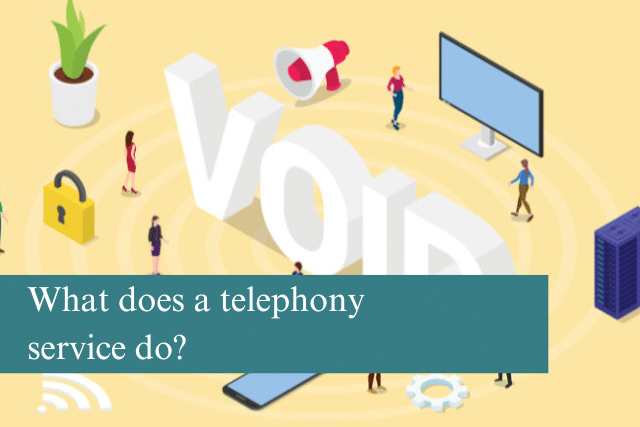
Understanding Telephony Services: What They Do and Why They Matter
Telephony services have become an integral part of both personal and business communication, enabling real-time voice communication across distances. But what exactly are telephony services, and how do they function in our daily lives?
What are Telephony Services?
Telephony services refer to the technologies and systems used for voice communication over distances. Traditionally, this involved landlines and analog systems, but modern telephony encompasses a range of digital solutions including mobile phones, VoIP (Voice over Internet Protocol), and cloud-based communication platforms.
Core Functions of Telephony Services
- Voice Communication The primary function of telephony services is to facilitate voice communication. This includes traditional phone calls, VoIP calls, and mobile conversations. The ability to transmit voice signals in real-time allows for immediate and clear communication, which is essential for both personal and professional interactions.
- Messaging Services Modern telephony services go beyond voice calls to include SMS (Short Message Service) and MMS (Multimedia Messaging Service). These services enable users to send text messages, images, videos, and other multimedia content quickly and efficiently.
- Video Calling With advancements in technology, many telephony services now support video calling. Platforms like Skype, Zoom, and FaceTime allow users to engage in face-to-face communication regardless of geographic location, enhancing the personal touch of remote interactions.
- Conference Calling Businesses heavily rely on telephony services for conference calling. This feature allows multiple participants to join a single call, facilitating meetings, collaborations, and discussions without the need for physical presence.
- Emergency Services Telephony services are crucial for emergency communications. Features like 911 in the United States ensure that users can quickly reach emergency responders in critical situations, providing location data and rapid connection.
Types of Telephony Services
- Landline Telephony Traditional landline telephony uses a network of physical cables and switches to transmit voice signals. Despite the rise of digital alternatives, landlines remain reliable for certain applications, especially in areas with limited internet connectivity.
- Mobile Telephony Mobile telephony leverages cellular networks to provide wireless communication. Mobile phones use radio waves to connect to cell towers, enabling voice, text, and data services. The convenience and portability of mobile telephony have made it a ubiquitous part of modern life.
- VoIP (Voice over Internet Protocol) VoIP technology converts voice signals into digital data transmitted over the internet. Services like Skype, WhatsApp, and Google Voice are popular examples. VoIP offers cost-effective and flexible communication solutions, especially for international calls and remote work.
- Cloud Telephony Cloud telephony, or hosted telephony, is a modern solution where the communication infrastructure is hosted in the cloud. This allows businesses to manage their phone systems through internet-based platforms, offering scalability, flexibility, and advanced features like automated attendants and call analytics.
Benefits of Telephony Services
- Connectivity Telephony services ensure constant connectivity, allowing people to stay in touch with family, friends, and colleagues from anywhere in the world. This is particularly vital in a globalized economy where remote work and international collaboration are common.
- Business Efficiency For businesses, telephony services streamline communication processes. Features like conference calling, call forwarding, and automated systems enhance operational efficiency and customer service.
- Cost-Effective Communication Modern telephony services, especially VoIP and cloud telephony, offer cost savings compared to traditional landlines and mobile plans. Businesses can reduce expenses associated with international calls and infrastructure maintenance.
- Enhanced Collaboration Telephony services support enhanced collaboration through features like video conferencing and virtual meetings. These tools are essential for remote teams, enabling effective communication and project management across distances.
- Scalability Especially with cloud telephony, businesses can easily scale their communication systems to match their growth. Adding new lines, features, or users can be done without significant infrastructure changes, providing flexibility as needs evolve.
The Future of Telephony Services
As technology continues to advance, telephony services are expected to become even more integrated with other digital communication tools. The rise of 5G networks promises faster, more reliable mobile connections, while advancements in AI could lead to more sophisticated automated systems and enhanced user experiences.
Conclusion
Telephony services are a cornerstone of modern communication, providing essential voice, text, and video capabilities. Whether through traditional landlines, mobile networks, or cutting-edge VoIP and cloud solutions, these services enable seamless connectivity and collaboration. For businesses and individuals alike, understanding and leveraging the right telephony solutions can lead to improved efficiency, cost savings, and a competitive edge in a digitally connected world.
Ready to Upgrade Your Communication Systems?
Discover how advanced telephony solutions can transform your business operations. Contact us today to explore tailored telephony services that meet your unique needs and drive your success forward.
Recommended Posts

Prepare for Windows 10 End of Life: What You Need to Know
18th July 2025

5 Ways Cloud-Based IT Solutions Can Empower Your UK Business
12th July 2025

Are you making the most of your Microsoft 365 licensing?
4th July 2025
